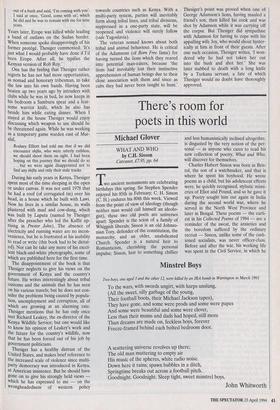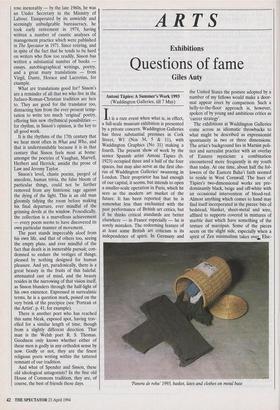There's room for poets in this world
Michael Glover
WHAT AND WHO by C.H. Sisson Carcanet, £7.95, pp. 64 Two ancient monuments are celebrating birthdays this spring. Sir Stephen Spender enjoyed his 85th in February; C. H. Sisson (C. H.) endures his 80th this week. Viewed from the point of view of ideology (though neither man would call himself an ideolo- gist), these two old poets are universes apart: Spender is the scion of a family of Whiggish liberals; Sisson is an old Johnso- nian Tory, defender of the constitution, the monarchy, and an older, unabdicated Church. Spender is a natural heir to Romanticism, cherishing the personal impulse; Sisson, heir to something chillier and less humanistically inclined altogether, is disgusted by the very notion of the per- sonal — as anyone who cares to read his new collection of poetry, What and Who, will discover for themselves.
Charles Hubert Sisson was born in Bris- tol, the son of a watchmaker, and that is where he spent his boyhood. He wrote poems as a child, but his adolescent efforts were, he quickly recognised, stylistic mimi- cries of Eliot and Pound, and so he gave it up. Poetry sought him out again in India during the second world war, where he served in the North West Province and later in Bengal. These poems — the earli- est in his Collected Poems of 1984 — are a reminder of the sweat, the anxieties and the boredom suffered by the ordinary recruit — Sisson, unlike some of the cush- ioned socialists, was never officer-class. Before and after the war, his working life was spent in the Civil Service, in which he rose inexorably — by the late 1960s, he was an Under Secretary in the Ministry of Labour. Exasperated by its unwieldy and seemingly unbudgeable bureaucracy, he took early retirement in 1974, having written a number of caustic analyses of management practice which were published in The Spectator in 1971. Since retiring, and in spite of the fact that he tends to be hard on writers who flow too readily, Sisson has written a substantial number of books essays, autobiographical writings, poetry, and a great many translations — from Virgil, Dante, Horace and Lucretius, for example.
What are translations good for? Sisson's are a reminder of all that we who live in the Judaeo-Roman-Christian tradition are heir to. They are good for the translator too, distracting him from the ever present temp- tation to write too much 'original' poetry, offering him new rhythmical possibilities for rhythm, in Sisson's opinion, is the key to all good work.
It is the rhythms of the 17th century that we hear most often in What and Who, and that is understandable because it is in that century that Sisson feels most at home: amongst the poetries of Vaughan, Marvell, Herbert and Herrick; amidst the prose of Law and Jeremy Taylor.
Sisson's level, chaste poems, purged of anecdote, human trivia, the false bloom of particular things, could not be further removed from any histrionic rage against the dying of the light. This is an old man gloomily tidying the room before making his final departure, ever mindful of the grinning devils at the window. Prosodically, the collection is a marvellous achievement — every poem seems to have discovered its own particular manner of movement.
The poet stands impeccably aloof from his own life, and that of others too, seeing the empty plate, and ever mindful of the fact that death is in inexorable pursuit; con- demned to endure the vestiges of things; pleased by nothing designed for human pleasure. And yet, paradoxically, there is a great beauty in the fruits of this baleful, attenuated cast of mind, and the beauty resides in the narrowing of that vision itself, as Sisson blunders through the half-light of his own existence. Expressed in surrealistic terms, he is a question mark, poised on the very brink of the precipice (see 'Portrait of the Artist', p. 41, for example).
There is another poet who has reached this same bleak, exposed spot, having trav- elled for a similar length of time, though from a slightly different direction. That man is the Welsh poet R. S. Thomas. Goodness only knows whether either of these men is godly in any orthodox sense by now. Godly or not, they are the finest religious poets writing within the tattered remnant of our tradition.
And what of Spender and Sisson, these old ideological antagonists? In the fine old House of Commons tradition, they are, of course, the best of friends these days.



























































 Previous page
Previous page